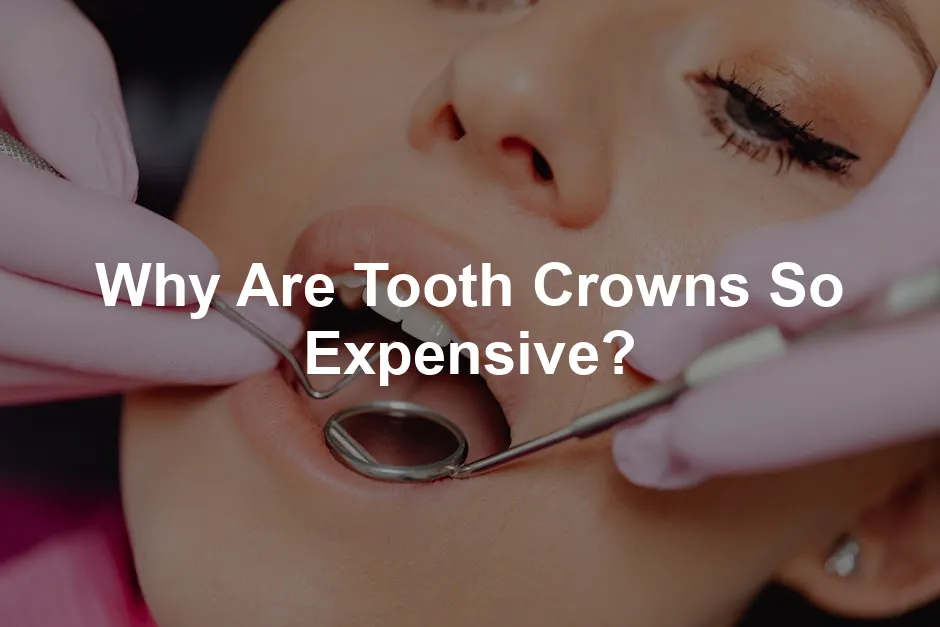
Why Are Tooth Crowns So Expensive?
Introduction
Dental crowns are tooth-shaped caps that restore damaged teeth. They strengthen and improve the appearance of your smile. Many people perceive crowns as costly, which can be a barrier to treatment. This article will explore why dental crowns have such a high price tag.
Speaking of maintaining that smile, you might want to check out the Oral-B Pro 1000 Electric Toothbrush. It’s like a personal trainer for your teeth, ensuring you brush away plaque like a champ!
Summary and Overview
Dental crowns serve as protective coverings for teeth that are damaged or decayed. There are several types of crowns, including porcelain, metal, and ceramic. The cost of dental crowns typically ranges from $500 to $3,000, depending on various factors.

Several elements contribute to the cost, such as the materials used, labor involved, advanced technology, and additional diagnostic procedures. Understanding these factors is crucial for making informed decisions about your dental care and budgeting for crown treatments.
If you’re looking to keep your teeth in tip-top shape while you’re at it, consider the Philips Sonicare ProtectiveClean 5100. It’s like a spa day for your mouth, with gentle vibrations that make brushing feel like a breeze!
What is a Dental Crown?
A dental crown is a custom-made cap that fits over a tooth. They are essential for restoring both function and aesthetics. Crowns can be necessary in several scenarios, including:
- Severe decay
- Cracked or broken teeth
- Teeth that have undergone root canal treatment
- Aesthetically displeasing teeth
There are different types of crowns available:
- Ceramic Crowns: These offer a natural look and are ideal for front teeth. They usually cost between $800 and $3,000.
- Metal Crowns: Made from alloys, these are durable and less expensive, typically costing $600 to $2,500. They are often used for back teeth due to their appearance.
- Porcelain Crowns: These provide a good balance of aesthetics and strength, costing about $700 to $2,800.
Crowns are vital for dental restoration, acting as tooth caps that enhance both the look and function of your smile.
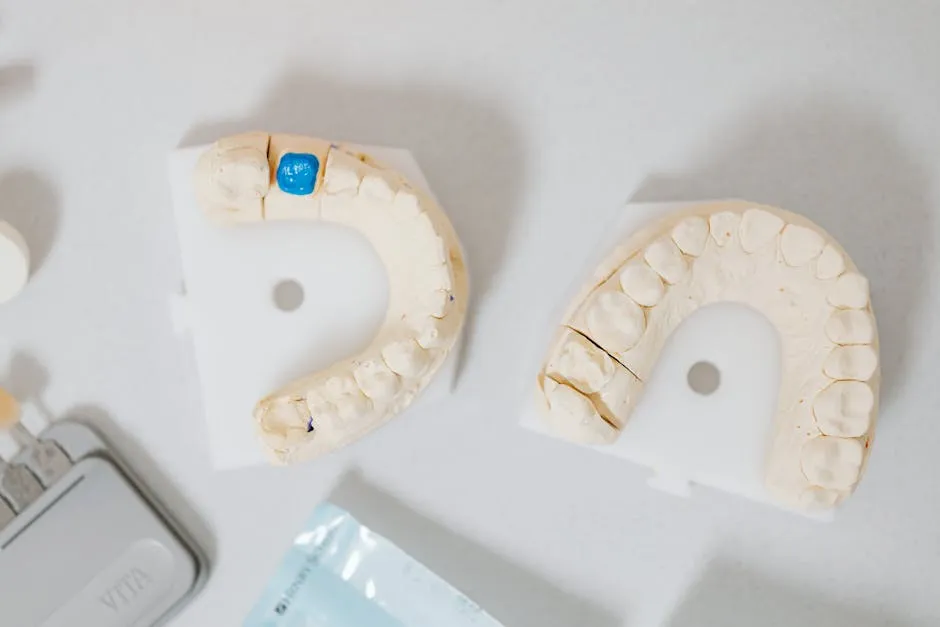
To keep your mouth healthy while you’re at it, consider adding some Dental Floss Picks to your hygiene routine. They make flossing easy, even for the most stubborn food particles!
Why Are Crowns Necessary?
Crowns play a crucial role in dental health. They are often needed when teeth suffer significant damage. Common reasons include decay, trauma, or wear from grinding.
Imagine a tooth that’s cracked or severely decayed. Crowns restore its strength and protect it from further harm. They also enhance the tooth’s appearance, giving you a confident smile.
Addressing dental issues early can save you from more complex problems later. A crown can prevent tooth loss, which is more costly and complicated to treat. By acting promptly, you can maintain your overall dental health and avoid more invasive procedures down the line.
Investing in a crown not only improves function but also preserves your natural teeth, contributing to long-term well-being.
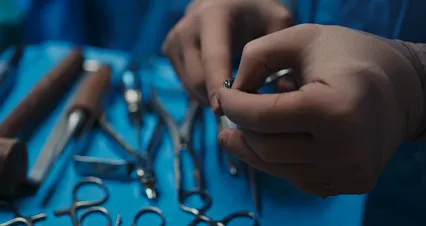
And while you’re on your journey to dental perfection, don’t forget to brighten your smile with Crest 3D Whitestrips Professional Effects. They can give your teeth that extra sparkle and help you shine even brighter!
Factors Influencing the Cost of Dental Crowns
When you see the price tag on dental crowns, it can be overwhelming. However, several factors influence the cost. Understanding these elements will help you appreciate the investment.

First, let’s discuss materials. Crowns are made from various substances, including porcelain, metal, and ceramic. Each material has its unique properties and price points. Porcelain crowns, while aesthetically pleasing, can be on the higher end of the price spectrum. Metal crowns are often less expensive but may not provide the same visual appeal.
Next, consider labor and expertise. The dentist’s skill level directly impacts the cost. Complex cases require more time and precision. If the dentist collaborates with a dental technician, this can add to the expense. Skilled professionals ensure that your crown fits perfectly and functions well.
Technology also plays a role in pricing. Advanced dental technologies such as CAD/CAM systems allow for precise measurements and quick production. While these tools can enhance the quality of crowns, they also come with higher costs.
Additionally, geographical location matters. Dental practices in urban areas often charge more than those in rural settings. Local economic factors can influence pricing, making it essential to shop around.
Insurance coverage is another crucial factor. Many dental plans cover a portion of the crown’s cost, but not all. Understanding your insurance policy can help reduce out-of-pocket expenses.
If you’re looking for a way to keep your dental tools organized, consider the Mouth Guard Case. It’s perfect for keeping your dental essentials in one place, especially if you’re using a night guard!
Lastly, additional services can increase costs. If you need preparatory procedures, such as root canals or extractions, these will add to the total. Each step in the process contributes to the overall expense.
In summary, while dental crowns may seem pricey, the quality of materials, expertise, technology, and additional services all contribute to their cost. Investing in a crown is an important decision that can lead to better dental health and a beautiful smile.

Material Costs
When it comes to dental crowns, the materials used significantly impact the overall cost. Crowns can be made from various substances, including porcelain, metal, and resin. Each material has its unique benefits and price range.
Porcelain crowns are popular for their natural appearance. They usually range from $800 to $3,000. While they offer great aesthetics, they may not be as durable as other options.
Metal crowns, often made of gold or alloys, provide excellent strength. These typically cost between $600 and $2,500. They are less visible and are often used for back teeth where aesthetics are less of a concern.
Resin crowns are the most affordable, usually costing around $300 to $1,000. While they are less durable, they can be a good choice for temporary solutions.
Understanding the cost differences among dental materials helps you make informed decisions. The longevity and aesthetic appeal of the crowns often justify the higher price. Investing in quality materials can lead to better results and fewer replacements over time.
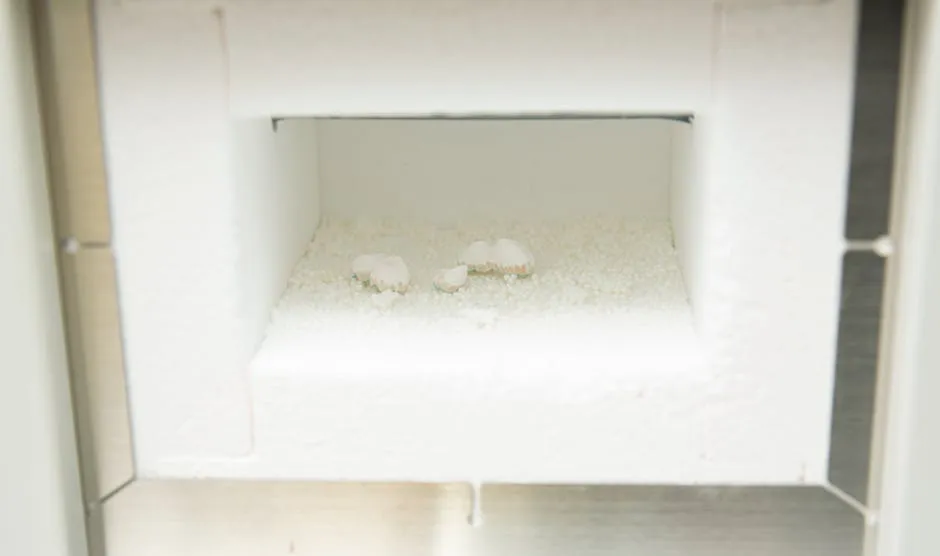
And speaking of quality, if you want to ensure your teeth stay healthy, consider the Teeth Whitening Pen. It’s an easy way to maintain your pearly whites between dental visits!
Labor and Expertise
The expertise of your dentist plays a crucial role in the cost of dental crowns. Crafting and fitting a crown requires significant skill and time, which directly influences labor costs.
The complexity of your case determines how much time a dentist will need. If your crown requires extensive preparation or if the case is particularly challenging, expect higher fees. A skilled dentist will ensure that your crown fits properly and functions well, which is essential for long-term success.
Additionally, dental technicians contribute to the creation of your crown. Their work involves precision and craftsmanship, which can increase costs. If the laboratory is outsourced, this can also raise the overall price due to additional fees.
Choosing a dentist with experience can lead to better outcomes and fewer complications. While it may seem more expensive upfront, investing in a professional who understands the nuances of dental crowns is worth it in the long run. This expertise can save you from potential issues and additional costs down the road.

Technology and Equipment
Advanced technology plays a significant role in dental crown production. One key innovation is CAD/CAM technology, which stands for Computer-Aided Design and Computer-Aided Manufacturing. This technology allows dentists to create precise digital models of your teeth. As a result, crowns fit better and feel more comfortable.
Using digital impressions instead of traditional molds has several advantages. Digital impressions are quicker and more accurate. They eliminate mess and discomfort, making the process easier for you. This means fewer adjustments later on, saving time for both you and your dentist.
However, the sophisticated equipment required for these technologies can be pricey. A CAD/CAM system can cost between $100,000 to $250,000. These costs often get passed on to patients, contributing to the overall expense of dental crowns. Investing in such technology enhances the quality of dental care, making it worth considering when evaluating crown costs.
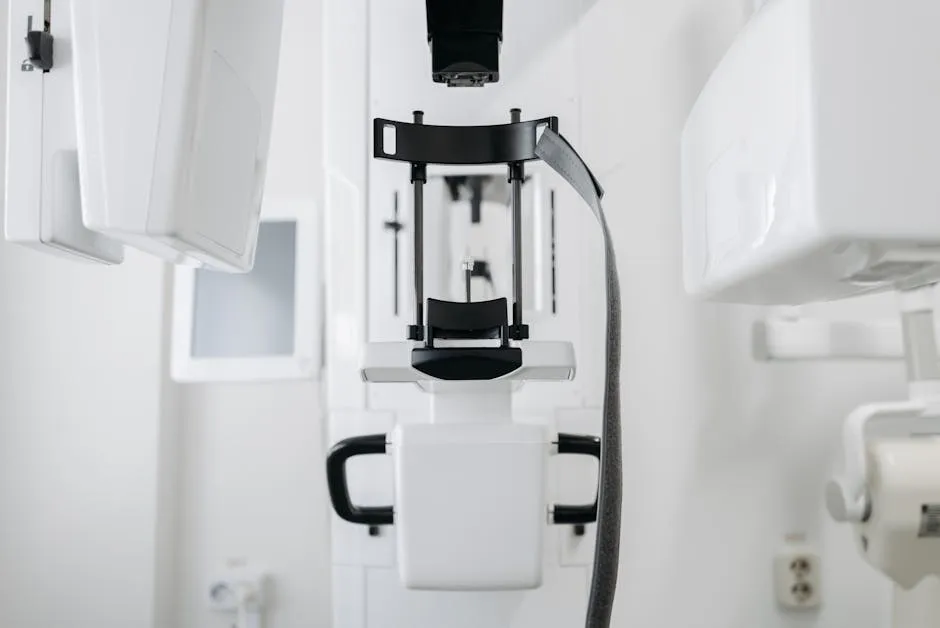
Insurance Coverage and Out-of-Pocket Costs
Insurance coverage significantly impacts the financial burden of dental crowns. Typically, dental plans cover a portion of the costs associated with crowns. However, the extent of coverage can vary widely. Some plans may cover up to 50% of the cost, while others might offer less.
Factors influencing out-of-pocket expenses include your specific insurance policy and the type of crown you need. Pre-existing conditions and the necessity for additional procedures can also affect coverage. It’s essential to understand your policy details before proceeding with treatment.
Taking time to review your insurance benefits can help you avoid surprises later. Many patients benefit from discussing their options with their dentist’s office, which can clarify potential costs. Being informed empowers you to manage your dental expenses effectively.

Geographic Location and Market Variations
Your geographic location greatly influences the pricing of dental crowns. In urban areas, the cost of living is typically higher. As a result, dental practices in these regions often charge more for services. Conversely, rural areas may offer lower prices due to decreased overhead and competition.
Regional economic factors also affect dental pricing. For example, practices in affluent neighborhoods may charge more, reflecting the local market demand. On the other hand, areas with fewer dental providers may see prices rise due to limited options.
Understanding these geographic variations is crucial. If you’re considering a dental crown, it might be worth comparing prices across different locations. Doing so can help you find a balance between quality care and affordability, ensuring you make the best choice for your dental health.

Are Dental Crowns Worth the Investment?
Dental crowns can seem pricey at first glance, but they offer significant long-term benefits. First off, crowns tend to outlast fillings. While fillings may need replacement every few years, crowns can last a decade or more with proper care. This durability can save you money in the long run.
Not only do crowns strengthen damaged teeth, but they also enhance your smile. A well-fitted crown can restore your tooth’s natural shape and color, improving your overall appearance. You deserve a smile that boosts your confidence!
Additionally, investing in crowns can lead to potential cost savings. Consider the costs of repeated fillings versus the longevity of a crown. Over time, the investment in a crown may prove more economical.
In summary, the benefits of crowns—longevity, aesthetics, and potential savings—make them a worthwhile investment for your dental health.

And while you’re considering your investment in dental health, why not make your home a sanctuary with an Air Purifier? Fresh air can do wonders for your overall health!
FAQs
What is the average cost of a dental crown?
The average dental crown cost typically ranges from $500 to $3,000, depending on various factors such as material and location.
How long do dental crowns typically last?
The longevity of dental crowns can vary but generally lasts between 10 to 15 years with proper care.
Are dental crowns covered by insurance?
Dental insurance coverage for crowns varies by plan. Many plans cover a portion, but it’s essential to check your specific policy.
What materials are used for dental crowns?
Types of dental crown materials include porcelain, metal, and ceramic, each offering different benefits and price points.
Can I get a dental crown in one visit?
Yes, same-day crowns are possible with CEREC technology, allowing for quicker treatment without multiple visits.
What factors should I consider when choosing a crown?
When choosing a dental crown, consider factors such as material, aesthetics, durability, and your dentist’s recommendations.
Please let us know what you think about our content by leaving a comment down below!
Thank you for reading till here 🙂
All images from Pexels




